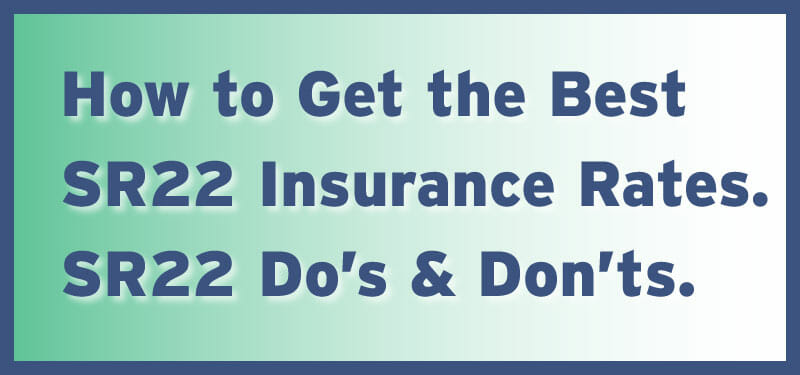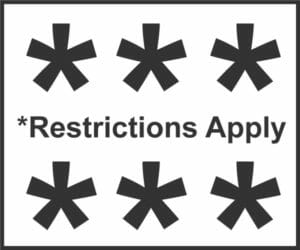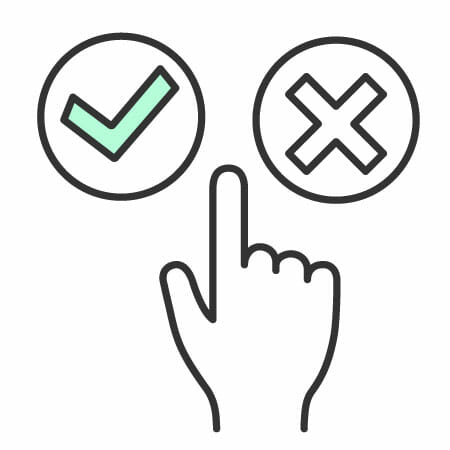Shopping for SR22 Insurance? Free guide to getting the best rates every time.
Your license is suspended. You need it back fast. DMV tells you that you need an SR22 insurance certificate. What do you do? If you’re like most people today, you punch in “SR22 Insurance” into your search engine, and then you get hit with an avalanche of information. You need a little guidance to get through this jungle of information.
Here, we have compiled 11 best practices—the Do’s & Don’ts—when shopping for SR22 Insurance. We want to provide you with the best practical advice compiled in one article. Our hope is that you benefit from the content by saving money, time and aggravation that is experienced when things aren’t done the right way. Let’s jump right into it.
#1. Don’t Get Caught in a Shark Frenzy
You probably don’t want to have your phone ringing off the hook with unsolicited calls. So pay close attention to what follows: Lead Generation Companies Are Not Insurance Agents. What does this even mean? Basically, when you enter your personal contact information into the wrong website form, you have dripped blood into the salty ocean water . . . and without a doubt, a school of hungry sharks will soon be circling. And this circling will escalate into what we call the insurance shark frenzy.
You can bet that you will regret the day that you clicked their submit button. What follows are countless calls from 3, 4, 5, up to 8, or sometimes even more salespeople—all calling, texting and emailing you all at once. All breathing down your neck at the same time. All trying to get you to buy insurance from them. And this can go on for days. Some stragglers even going on for weeks. Needless to say, it’s not fun and you might find yourself hanging up on these people just to make it through the next couple of days.
Their “Match” service is really a Sell-Your-Information-To-Multiple-Providers-That-Will-Hound-You, because they paid a lot of money for your information.
Here are a few examples of insurance lead generation companies — and by their own admission (although cryptic) they are not insurance providers (carriers/agents):
EverQuote: Terms and Conditions of Use (notable section: “1. Our Services”)
NetQuote: Terms and Conditions (notable section: “Requests for Quotes or Offers”)
AgentInsider: Terms of Use (notable section: “Requests for Quotes or Offers”)
InsuranceQuotes: Terms of Use (notable section: “Requests for Quotes or Offers”)
The Zebra: Terms of Service (notable section: “Communications with You About Your Insurance Needs”)
And the list goes on and on. These days, it seems like more and more companies are more interested in selling leads to others than actually selling insurance. Really, selling insurance leads seems a lot easier than helping someone actually purchase insurance. The reality is that customer satisfaction is higher when consumers receive one-on-one attention to get the right insurance coverage for their family.
Fun facts (small print)
From The Zebra’s Terms of Service: “To withdraw your consent to be contacted by telephone, send a written “Notice of Revocation of Consent” to the following address: . . .” Geesh, why not get the Pony Express on this? By the time you’re off this list, you just might be a little worse for the wear.
If you read closely, some of these sites say that it does not matter if you are on an official Do-Not-Call list. If you use their service to get information, they can call you.
Worth the price of admission?
Some websites appear to be selling SR22 insurance, or just providing instant rates from multiple sources. In exchange for some insurance rate information, they require your contact information. Seems like a small price, right? Maybe not.
Quite often, there’s much more to it. Your information is turned around and sold. Not once, but many times over. Sold to the highest bidders. Bidders looking to sell you insurance. Bidders that you don’t even know. What quite often happens next is that you immediately start getting hounded by different insurance providers responding to your “inquiry.” We’re talking phone ringing off the hook. You are now experiencing the “shark frenzy.”
Lead Generation Companies Typically Don’t Cater to High Risk Drivers
Typically, a good portion of the carriers promoted by these sites don’t want to sell SR22 Insurance. The big names that you see listed on their sites prefer a “vanilla” risk. So drivers needing an SR22 would not be looking in the best marketplace for their situation.
Check Out A Company’s About Us Page Before Submitting Your Info
First thing you should do before submitting your information to any company is to check out their “About Us” page. You want to get a feel for what type of company they are. What are their beliefs, their mission, their leadership, history, etc.
All that said, if you feel the information they provide is worth giving up some information and control, then it might be worth it for you to go check them out. Our point is not to knock their service, but to draw to light the consequences of using such a service.
Look for a sales phone number and company address.
One big issue is that it is hard to tell the difference between a lead generation company and an insurance company/agency. They look very similar. But there are some signs to look for. First, look for providers that clearly list their phone number. Insurance carriers and agencies want to sell you a policy and make it as easy as possible for you to talk to an agent. But if you can’t even find a phone number for a sales agent, this might indicate that you are on a lead generation site, and not on an insurance provider’s site.
Remember, the lead generators want to sell your information to multiple people. They won’t profit if the lead goes to just one person. Also, look for companies that clearly list their address. I never understood why companies “hide” this information. Seems like a critical component of making a decision to buy something from a company. When on the web, I always wonder to myself, “Is this company legit?” if I can’t find their address. It should be on everyone’s checklist to see where a company is based before submitting personal information to their company website.
Bottom line: Shopping insurance rates seems so easy on these slick sites, but going this route will cause you to lose time as these quote aggregators will cause you much aggravation. You are better off shopping directly with SR22 insurance providers. Carefully research the provider before you submit your information to them. Check the provider you are interested in with the Better Business Bureau (BBB), Check License Status with the California Department of Insurance, and check online reviews from Google and Yelp. If you are having a problem finding them with these sources, you may just want to move on to another provider.
#2. Don’t Believe in Fairy Tale Marketing
We all love a movie with a happily-ever-after ending, but with SR22 insurance, there’s not always the fairy tale ending we wish for. In this “Don’t” segment, we warn you about the proverbial wolf in sheep’s clothing. What is the warning?: Don’t get drawn in by advertisements that are just to good to be true. Save yourself time—and money—by not bothering. Solid companies don’t stoop to the following tactics to attract customers. They stick to the basics: Good rates and good service.
“Rates As Low As”
If you see “teaser” ads with “Rates As Low As,” just know that odds are that you are going to pay more. Over the years we’ve seen it all. Originally, it was “Rates As Low As $29.” Over 25 years ago, we knew these competitors were not selling Sr22 insurance for $29 a month. But to our surprise, that was just the start. Following, we saw $25, $19, $15, $14, and even now $10. Serious one-upmanship for sure. How do they get away with this you ask? With a good old fashioned “*Restrictions apply” disclaimer.
We were even dumbfounded when we saw an ad claiming these low rates until we looked at the fine print. To qualify for these advertised SR22 insurance rates, the earth, moon and sun would have to align. Here’s what we uncovered built into the rate that the advertiser listed:
- Rock-bottom liability coverage
- No physical damage coverage for the vehicle
- No uninsured motorists coverage
- Perfect driving record, married, low-risk economy vehicle
- Zip code with a population of 22 people — No Kidding!
So, in a state of 39 million people, they chose a town with 22 people living in it (95915 – Belden, California). So basically, no one really qualifies for the low rate. Another big waste of time of people’s time.
The “Holiday Sale”
The SR22 Insurance “Holiday Sale”. Creative marketing: yes. But sorry, insurance premiums don’t go on sale. One possibility is a discount of an already overinflated fee. Still, the “sale” isn’t going to save you money.
The “Free Sr22”
The big gun: The “FREE SR22”. No one is giving away free auto insurance. You don’t get that SR22 certificate without buying the insurance policy that goes with it. So, in the end, it’s not really free.
Bottom line: We all know by now that nothing in life is free. Trust your gut, and try to avoid those that utilize such shady tactics. Although this section reads more like a fable than a fairy tale, we hope that this section alone helps you in your quest for Sr22 insurance.
#3. Do Shop Smartly
When choosing an SR22 insurance carrier, having choices is a good thing. In this “Do” segment, we encourage drivers to Shop Smartly, and not make a huge pricing mistake. To understand what we mean by “Shop Smartly”, you first need to understand the distribution channels of property & casualty insurance products.
What are the marketing systems for insurance?
- Independent Agency and Brokerage System
- Usually free to represent as many or as few insurers as they want
- Independent agents and brokers are not employees of insurance carriers
- Independent contractors
- Own the expiration of renewals
- Exclusive Agency System (a.k.a. Captive Agency System)
- Usually restricted by contract to representing a single insurer, or a group of insurers under common ownership and management.
- Exclusive agents are limited to selling only the policies of the insurer they represent
- Exception: some exclusive agency companies allow their agents to place business with other insurers if the exclusive agency company does not offer the product or service needed.
- Independent contractors
- Typically do not have any ownership of expirations of renewals
- Direct Writer System
- Usually restricted by contract to representing a single insurer, or a group of insurers under common ownership and management.
- Uses sales agents (a.k.a. sales representatives) who are employees of the insurer they represent
- Not independent contractors
- Typically do not have any ownership of expirations of renewals
So, back to the point, what do we mean by Shopping Smartly? Well, some insurance providers represent multiple insurance companies (independent agents and brokers), while others represent only one insurer (exclusive/captive agents and direct writers).
So odds are further in your favor when shopping with a provider that represents multiple carriers. Multiple carriers means that carriers compete for your business. This can mean that you have more options in pricing, coverages, limits, endorsements, etc.
You can’t beat everyone all of the time, so it pays to shop
Independent, Exclusive, or Direct—No one can beat every one all the time. Sometimes the independent agent has the best option for a consumer. Other times it could be an exclusive agent. And at other times, a direct writer. What we’re saying is that each channel of distribution has its time when it shines in the limelight.
Independent channel: Strengths and Weaknesses
- Strengths
- Choose from multiple carriers
- Ability to place a broader selection of risks
- Stronger relationships with insureds
- Deeper knowledge of insured’s file
- Higher incentive & sensitivity to customer satisfaction
- Compensation dependent on insured renewing
- Often times lives in community and feels responsibility
- Weaknesses
- Spread thin by so many product offerings
- Learning & operating multiple carrier underwriting systems
- Learning differing policies from multiple carriers
- Keeping up with underwriting changes
- Spread thin by so many product offerings
Exclusive/Captive Channel: Strengths and Weaknesses
- Strengths
- Focused and streamlined product offerings
- Strong branding
- Stronger relationships with insureds
- Deeper knowledge of insured’s file
- Higher incentive & sensitivity to customer satisfaction
- Compensation dependent on insured renewing
- Often times lives in community and feels responsibility
- Weaknesses
- Typically only one carrier so choice is on a “take-it-or-leave-it” basis
- Challenges with responding to non-standard risks
- Nowhere else to turn when the carrier’s terms turn unfavorably for the insured
Direct Writer Channel: Strengths and Weaknesses
- Strengths
- Streamlined product offerings
- Strong branding
- Lower than average operating costs
- Weaknesses
- Typically only one carrier so choice is on a “take-it-or-leave-it” basis
- Challenges with responding to non-standard risks
- Nowhere else to turn when the carrier’s terms turn unfavorably for the insured
- Weaker/Non-existent relationships with insureds
- Insured must start over fresh with each person they speak to at the carrier
- Less incentive & sensitivity to customer satisfaction
- Compensation typically not dependent on the insured renewing
- Once a transaction/call is complete, representative will probably never speak to that insured again
Get more for your insurance dollar
We all want to get the maximum value when we buy a product. Insurance is no different. It’s like shopping in a grocery store. The analogy goes like this: Imagine you go into your neighborhood grocery store to pick up a box of cereal for the kids, and at this store offered only one brand. At another store across the street, they carry a whole bunch of different brands. That’s the point and what’s important here. Choices help you get the biggest bang for your buck.
Bottom line: You need competing carriers. You need choices. You need options. This quite often results in better pricing and coverages on SR22 insurance.
#4. Do Opt for an SR22 Insurance Specialist
When you drive a Mercedes and hear of feel something going wrong with it, you don’t take it into a BMW mechanic, or a do-it-all shop. You head to your local Mercedes Benz dealer, or an independent Mercedes specialist. Why? Because they have the knowledge and experience of working with all Mercedes models. They can usually diagnose, get the right parts, and repair the vehicle better and quicker than anyone else. They do what they do, day in and day out. And this quite often results . . . in the best results.
Now, we understand that purchasing SR22 insurance is not the same as maintaining a Mercedes Benz, but the principle of going to a specialist still strongly applies. Experience and expertise saves you time, money and aggravation.
An agent that specializes in SR22 insurance knows all the ins and outs
From knowing which carriers have the best pricing, to having the experience to get the job done right, a specialist is usually a strong choice. One of the big strengths of a specialist is the relationships they have developed with insurance carriers. In particular, carriers that specialize in high-risk applicants. Commonly called “appetites”, these carriers want to sell insurance to high-risk drivers, many who need an SR22.
If you go to a provider that does not specialize in SR22 insurance, there is a good chance that you could miss out on the pricing offered by one of these high-risk carriers, as they might not represent carriers like these. Additionally, many of the “specialty” carriers don’t advertise through mass media, so they are not on the radar of most consumers. Nevertheless, these high risk carriers drive the lion’s share of the SR22 insurance marketplace.
Bottom line: Going with a high-risk insurance specialist—as opposed to a “generalist” that does it all—will position you most often to do better. You benefit from the experience, wisdom, carrier access & pricing, and relationships that a provider who specializes in SR22 insurance brings to the table.
#5. Don’t Give Yourself an Instant Headache
When it comes to “Instant Quotes,” typically speed comes at the cost of accuracy. Most consumers nowadays appreciate speed of delivery. Well, when it comes to insurance, this might not always be a good thing.
Many times, the online raters don’t ask enough questions, don’t ask the right questions, or just assume the best. Sure, the system might give you a rate, but it is often wrong, and worse, the coverage may very well be inadequate. So, if using these online tools, be aware of their limitations.
Their goal is not accuracy of rates or adequacy of coverage — It’s to get you to submit your information.
Advertising is competitive. Advertising is expensive. Advertising can make or break some big companies. So by the time an insurance provider gets you onto their website to start completing an inquiry, they can be in pretty deep. So they really need it to count. They need to get you to finish the form and submit it. If not, they lose.
What they have realized is that the more questions they ask, the more people will abandon the process. And they just can’t have that happen. So what do they do? They simplify. More accurately—they oversimplify.
This oversimplification has some consequences. Mainly inaccurate rates and inadequate coverage (as we discuss below).
What are some of the consequences of oversimplification?
- Inaccurate annual mileage (more often than not, miles entered too low)
- Incorrect driving history (violations, accidents, claims, license suspensions)
- Vehicle usage classification issues (personal use vs. commute vs. business use)
- Undisclosed drivers (failing to list all drivers that live with an insured or drive the insured’s vehicles)
- Inadequate coverage / limits (applicants not getting proper coverage for the risk)
- Vehicle customization (usually not covered properly without endorsing coverage onto the policy and paying a premium)
- Missed discounts (affinity, professional, educational, multi-policy, multi-car, etc.)
Whose interests are taking priority?
The guiding principle of putting the customer’s interests above their own is one that is not always easy to practice. It can cost a business time, effort, and money. It can even cause a company to lose sales. But even with all that, doing the right thing for the customer is just . . . well, the right thing to do.
Not asking enough questions is not in the customers’ best interests. Leading on consumers to feel protected with reassuring ads, all the while providing a service that lacks professionalism is not in the customers’ best interests.
The doctor’s diagnosis analogy
Suppose you went to your doctor with a complaint of pain in you stomach. Suppose that he spent 2 minutes with you, didn’t examine you, did ask you very many questions, rips out a prescription sheet, writes out a prescription and tells you a nurse will be in, in a minute to go over a couple of things and to get your signature for billing.
Well, you might feel a little uneasy. Can you trust the doctor’s diagnosis? Did he even care? Is he just in it for the money? Although health is more important to (most) people than their insurance coverage, a similarity can be drawn.
Insurance protects you from financial harm. If an insurance provider doesn’t take the time to ask questions, then how can they prescribe the correct coverage? How can you feel that you have been taken care of without someone taking the time?
Pay now, or pay later
Sometimes you just need to spend a little more time to make sure things get done right—especially when it comes to insurance. The thing about insurance is that you don’t get to test it out . . . until there’s a problem (a claim). Some consumers are so focused primarily on the purchasing side of an insurance policy, when they really need to focus more on what happens when they need to use their insurance policy. Pay a little more—with your time—up front, and you can save thousands of dollars later in unpaid claims and the grief that comes along with it.
When an instant quote isn’t really instant
Quite often, consumers will get drawn into an insurance quote form promising an “instant quote”. After taking the time to complete the form, someone searching for SR22 insurance will get to the end to the form and feel hoodwinked. The promise of an “instant” quote turns into disappointment when directed to “Submit Now for Your Quote.” You invested the time, believing you would receive instant pricing information, but often it’s just a regular contact form. Contact forms are not bad in and of themselves, it’s just unfair that the promise of “instant” from the provider was not honored.
Bottom line: Instant is not always better. Put in a little more effort into your SR22 insurance shopping and reap the benefits of more accurate quotes and better understanding of your coverages.
#6. Do Tell It As It Is
Sometimes consumers are afraid of spilling all the beans. They don’t want to pay too much, and it’s understandable. The fact is, the insurance companies have underwriting departments and systems that pretty much can find out most everything. So it’s best to be up front with all of the bumps and bruises of one’s driving history.
Save yourself from an uprate in your premiums.
Between your MVR (motor vehicle record) from the DMV and the C.L.U.E. (Comprehensive Loss Underwriting Exchange) Report from LexisNexis, the insurance carriers will find out everything in the end. In every industry these days, data is playing a huge factor. Insurance carriers are no different. In fact, they love data and invest heavily in making sure that they get accurate driving histories on applicants. They don’t want to leave any money on the table. Their goal is to get adequate premium for the risk being insured.
Providing accurate information during the shopping phase helps You.
If you are shopping for insurance, and don’t have accurate information, you are wasting your time. You can get quotes from competing providers, but if the less expensive one doesn’t have your correct driving history, the premium on the quote will change.
When you get the premium increase, you will quite often be in a worse situation than if you had an accurate quote upfront. What is the risk?:
- Experiencing frustration from receiving a whopping bill in the mail for the increase in premium.
- Being locked in with an insurance carrier that doesn’t have the best rates for your driving record.
- Paying a cancellation fee or short-rate cancellation charge to cancel the policy before term.
- Having to completely start over and sign up with another carrier.
- Losing any carrier or broker fees that you may have paid.
A quote is just a quote is just a quote.
Although some providers take the quoting process very seriously, others might have a different attitude. This attitude rejects personal responsibility and puts the blame on everyone else, particularly the consumer. With this in mind, it’s important to ensure that the provider documents on the quote proposal what your premium is based on—including tickets, accidents, claims, and license suspensions. This will help you to avoid a costly uprate as you know, and they know, and you know that they know what is on your record. So you can avoid surprises after the policy has been purchased.
Bottom line: When shopping for SR22 insurance, do everything you can to provide the most accurate annual mileage, vehicle usage, and driving history. The carriers almost always find out everything anyways after the policy has been purchased and underwent the underwriting process. If you don’t provide accurate info, the results will be cleaning up a mess that you don’t want to be subject to. Help yourself save time and money with a detailed and factually accurate approach to shopping for your SR22 insurance.
#7. Do Work with a Thorough Provider
Insurance companies love data. They can’t get enough of it. As time passes, they ask for more and more information. Why? So they can understand the risk profile better. As a result, they are better able to project accurate rates and price their products accordingly. Insurance companies need to charge sufficient rates for the exposure, but they have to be cautious not to charge too much. Why, because nobody will purchase their insurance products if their rates are too high.
In a day and age of instant everything, we have become conditioned to believe that everything should be push-button-turnkey-no-questions-asked-cakewalk. The truth of the matter is that insurance is not as simple as the marketing agencies want you to perceive.
Insurance is a complex financial mechanism. There are many moving parts. Insurance companies have many departments (e.g., marketing, agency, underwriting, claims, accounting, actuarial, investment, legal, reinsurance, and more).
So why do insurance commercials make everything so simple?
They understand that if the process seems like to much work, no one will call them and their marketing efforts will suffer.
Insurance doesn’t have to be hard, unless you make it hard.
A good agent can guide you through the process, without taking shortcuts that could cost you in the end. A good agent is like an experience jungle guide, pointing out the pitfalls and getting you where you need to be faster than going it on your own.
Find an agency that asks enough questions and underwrites the policy thoroughly. Why is this important? Well, insurance carriers want to know your risk characteristics so that they can charge an accurate premium for a certain risk. Often, what happens, the salesperson will make assumptions in order to speed up the quoting process, and wait to ask the questions at the time of the application if you decide to insure with them.
So, most salespeople will assume the best case scenario (leaving out tickets, accidents, claims, drivers, getting accurate mileage instead of just entering low mileage), and this leads to the most favorable terms for the quote. Problem is that when it’s all said and done, the carrier will pull all of the information, and when they do, if anything changes, your rates can go up.
Learn More About Our SR22 Insurance Services
Bottom line: If the person/company that you are working with doesn’t ask enough questions, your internal alarm should be going off. You understand the factors that go into getting an accurate insurance rate. Find someone that is detailed and cares enough to take the time to make sure they get it right.
#8. Do Get a Detailed Quote in Writing
Have the agent email you the SR22 insurance quote proposal. Do this before you agree to move forward to purchase the policy—and provide your payment information. It’s always a good idea to look over the details when you are buying something, especially a financial services product like insurance. It just makes sense. It’s a complex product with many components. Always make sure to get the quote in writing.
Avoid buyer’s remorse by taking time to get all the facts
This is not a decision to be taken lightly. Slow down for a moment. We understand the desire to get it over and done with, but this buying decision will affect you for years to come, so make it count. Get the information you need to make the best possible decision. Take enough time to weigh your options.
What should be included in the written quote proposal?
- The insurance carrier’s quote form including the following:
- Name of the underwriting carrier
- Named Insured’s information
- Policy term
- Covered drivers
- Violations, accidents, suspensions for covered drivers
- Excluded drivers
- Vehicles
- Primary use of the vehicle and annual miles
- Coverages, limits, and deductibles (if purchasing comprehensive & collision)
- Premiums per coverage line, as well as total premium for the policy term
- Fees charged by the carrier
- Payment plans
- The insurance agent’s supplemental information:
- Optional limits of liability including their premiums
- Optional coverages/endorsements including their premiums
- Optional deductibles (if purchasing comp & collision) with the premium differences
- The insurance carrier’s A.M. Best Financial Ratings
- Broker Fees charged by the insurance agency (if any)
Bottom line: Find a provider that will put the SR22 insurance quote in writing—before you hand over your payment. Not just a simple quote, but a detailed quote (see above for the particulars of what should be included). This helps you understand what you are getting and leads to increased satisfaction with the policy purchase.
#9. Don’t Work with Anyone Who Tells You It’s OK to Lie or Commit Fraud
You know the saying: “A few bad apples spoil the barrel.” Well, every industry seems to have some individuals that don’t like to follow the rules. What rules are we talking about? The laws of the State of California. Specifically, the Financial Responsibility Laws and Insurance Code of the California Vehicle Code (statutes), and the regulations created by the agencies that oversee these matters, which in this case is the California Department of Insurance Regulations and the California Department of Motor Vehicles.
You’re in a tough situation. Maybe you’ve been arrested for a DUI or reckless driving offense. Maybe you’ve been in an uninsured accident and are facing the fact that you will be paying for all damages out of your pocket. At times like these, we often see “predatory” business practices rear their ugly head. Some unscrupulous individuals see an opportunity to capitalize on a difficult situation. They might sense that you are scared and that you are susceptible to questionable influence.
Maybe you have heard some of the arguments—They sound a lot like the convincing appeal made by attorney Fletcher Reede (played by Jim Carrey) to Samantha Cole (played by Jennifer Tilly) in the comedy Liar Liar.
- You’re the victim here
- How dare they raise your rates for this
- Just don’t tell the truth, they’ll never find out.
Needless to say, there is some serious misinformation floating around. “Hacks” that one can utilize to “game the system.” One of the most widespread one’s we’ve heard of is getting a non-owner’s policy with an SR22 attached, even if that person owns a vehicle(s).
Many times a person in this situation might hear a whisper from someone in their DUI classes that mention this. Maybe their current or prospective agent tells them about the idea. Possibly even a video by an agent that was foolish enough to post this information online. Regardless of the source, the advice is not sound.
The rules are clear on this one. All vehicles registered to an individual must be covered by the policy issuing the SR22 Certificate.
Rules: They’ll twist them. They’ll bend them. They’ll break them.
But their not doing this out of the goodness of their hearts. The motivation is to help themselves. To make a sale. To make a commission, and to do whatever it takes. Problem is, when something goes wrong, they’ll be nowhere to be found.
Responsibility: They’ll duck it. They’ll deny it. They’ll blame it . . . all on You!
When things go wrong, typically after an accident, things will start to change. Insurance carriers are not charitable organizations, and if they feel that they have cause to deny a claim due to fraud, they will deny.
Insurance carriers try not to “give away the farm” so they conduct a proper investigation before paying claims out. If they find out that they were not given the correct facts, you can be certain that they will do what they can to get out of paying the claim. You can’t blame the insurance carriers when an insured commits fraud by lying t the company.
You shouldn’t have to live life while looking over your shoulder.
This is where that once friendly—but unscrupulous—agent changes his/her tune and turns. Bold faced, they’ll say: “I never said that” or “I would never . . .”, or “Can you show me where I told you such a thing”, and the list goes on.
We believe that you deserve all the facts
Do yourself a big favor. If you’re in this situation (requiring an SR22), play it straight. Don’t bring anymore heat on yourself. Think Honest Abe Lincoln style when it comes to this.
Bottom line: Avoid any liars, fraudsters, hucksters, and smooth-talkers like your financial well-being depends on it . . . because it does. Don’t get swept up into a situation that a minimum just doesn’t feel right, and at worst could lead to bigger troubles. Playing it straight is the best policy.
#10. Do Find Out the Fees Up Front
Over the years, we have heard the stories for our insureds. At the last minute, when signing the paperwork, they are informed of a broker fee. We believe this to be unfair to the consumer. We feel that providers should clearly and fully disclose their broker fee (if any) on the written quote.
What is a broker fee anyway?
Broker fees are charges that an insurance broker adds to the application. They are typically non-refundable amounts for placing insurance on behalf of the customer.
These fees are separate from what the insurance carrier charges.
Broker fees are not to be confused with fees that the insurance carrier charges.
Broker fee details you need to know:
- Amount of the broker fee
- Is this a one-time fee, or is it charged on every renewal
- Is there a broker fee for making a policy change
- Is there a rewrite fee if the policy cancels and needs to be rewritten
- Is the broker fee refundable (typically not)
Find out up front what fees the agent/broker is charging. Do they charge a broker fee or not? If they do, how much is it. Also, do they broker fees for service (e.g., policy change fees, cancellation fees, re-write fees). These fees are separate from the actual insurance carrier fees which are standard. Most states now require broker fees (include fees for new business, policy changes, etc) to be fully disclosed in a “Broker Fee Agreement”. But before you get to far, ask and write down what the agent tells you the fees are. You don’t want any surprises when you get to the two-yard line of the application.
Don’t brokers get paid a commission? So why are they charging an additional fee?
Providers that charge broker fees state the following reasons:
- Carriers cutting commissions
- Increased operating costs
- Earlier policy termination, characteristic of high risk insurance profiles when compared to standard/preferred insurance business as a whole
- Cover costs of servicing accounts that require a higher level of service and attention
- Turn unprofitable transactions into profitable transactions
Bottom line: It’s your money, you need to spend it wisely. Find out about a provider’s broker fees upfront, before you have invested too much time and/or effort. Just because you need SR22 insurance, doesn’t mean you have to pay too much or be subject to exorbitant broker fees. Insurance providers need to make money too, just make sure that everyone is being treated fairly.
#11. Do Establish a Relationship with Someone You Trust
Your need for auto insurance lasts a lifetime. Your need for an SR22 lasts a minimum of 3 years. And in California, a DUI stays on the record for 10 years. Consequently, you will be in the high risk auto insurance market for quite a while.
When shopping for SR22 Insurance, your not just shopping for affordable rates and proper coverages. Your also shopping for a provider. A provider that doesn’t just forget who you are after you sign on the dotted line.
You’re in this for the long haul.
As your life changes, so do your insurance needs. You don’t want to go back to square one every time something changes in your life. Changing providers frequently can prove to be tiresome and costly. Find a provider that has the experience and capacity to respond to your ever changing needs.
It’s nice to have someone that knows you and your file.
If possible, find an agent that you develop a relationship with. Too many times, as we have all experienced, we call for service and have to talk to a different person. We have to explain our situation over and over again. So, if you can it is always nice to find someone who knows you and cares about you.
Bottom line: Needing SR22 insurance is a long road. You will be dealing with this aspect of your life in some aspect for 10 years. Find someone to partner with that knows your situation and has your best interests at heart.
Conclusion:
SR22 insurance shopping is an important part of your financial well-being. From getting competitive rates, to having proper coverage, to being treated fairly—a detailed approach is required for this serious undertaking. After reading this article, you now are an informed and well-equipped SR22 insurance consumer. You are now ready!
Patrick McKenna, founder and owner of McKenna Insurance Services, has spent 25 years in the insurance industry, both as a claims adjuster for Mercury Insurance Group and as an insurance agent in Bonita, California. Born into a family of insurance agents in the San Diego area, Patrick has deep knowledge of personal insurance services and is passionate about helping people better understand the industry landscape to make the best possible decisions.
















